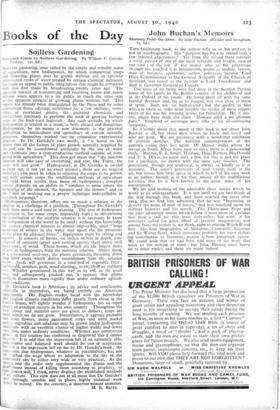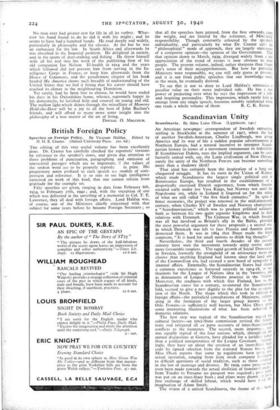John Buchan's Memoirs
Tins fascinating book, as the author tells us in his preface, is not an autobiography. His " purpose has been to record only a few selected experiences." Yet from the record there emerges a vivid picture of one of the most versatile and lovable men of our time ; of the son of the manse who in his pilgrimage th.ough life touched it at innumerable points as student, lawyer, man of business, sportsman, author, politician, became Lord High Commissioner to the General Assembly of the Church of Scotland, was raised to the peerage as Lord Tweedsmuir and died as Governor-General of Canada.
The roots of his being were laid deep in the Scottish Puritan home of his family in the Border country of his childhood and in the Oxford of his youth. He loved them all with the same faithful devotion and, far as he ranged, was ever close to them in spirit. Such was his background ; but the quality in him which is likely to •trike most forcibly the reader of these experi- ences of his was his amazing genius for friendship. He, if any- one, might have made the claim " Humani nihil a me alienum puto." Shepherd o'- sovereign were alike to his all-embracing sympathy.
So it comes about that much of this book is not about John Buchan at all, but about men whom he knew and loved and who are gone. We are presented with -a wonderful exhibition of portrait sketches. The brilliant contemporaries of the author's young days live again. Of Milner, under whom he served in South Africa from 19o1 to 1903, there is a penetrating study. Balfour, F. E. Smith, Haldane, Haig, Ramsay MacDonald and F. S. Oliver, to name only a few, for this is not the place for a catalogue, are drawn with the same sure touches. The portraiture, though not uncritical, is always as kindly as it is arresting. The artist's generosity of soul reveals itself in his art, but leaves him little space in which to tell of his own work as an author, though it is for that, among all his multifarious activities, that he is best known to the great mass of his countrymen.
We are told nothing of the admirable short stories which he wrote as an undergraduate. It is not until we are two-thirds of the way through this book, and have reached the years after 1914,- that we find him admitting that he was " beginning to deserve the name of man of letters," and just touching upon his military histories and his novels. The Thirty-nine Steps and the pure adventure stories which follow it were more of 3 relaxa- tion than a task for this born story-teller; but some of his romances called for great effort of creative imagination, and among these the author is, we think, right in placing Witch Wood first. His four biographies, of Montrose, Cromwell, Augustus and Sir Walter Scott, which constitute probably his most endur- ing contribution to literature, receive a bare paragraph apiece. We could wish that we had been told more of the work that went to the writing of them ; but John Buchan must hurry on to other topics, and these are many indeed.
No man ever had greater zest for life in all its variety. What- ever his hand found to do he did it with his might ; and he seems to have had a hundred hands. He read deeply and widely, particularly in philosophy and the classics. At the bar he was an enthusiast for the law. In South Africa and afterwards he was absorbed in the Imperial problem. He delighted in society, and in the sports of deer-stalking and fishing. He threw himself with all his zeal into the work of the publishing firm of his old companion Ian Nelson. Ill-health in 1914 and the years which followed did not prevent him from serving in the In- telligence Corps in France, or keep him afterwards from the House of Commons, and the penultimate chapter of his book headed My America shows such breadth of understanding of the United States that we feel it fitting that his career should have reached its climax in the neighbouring Dominion.
Yet surely, had he been free to choose, he would have ended his days in his Oxfordshire home, whence, supremely happy in his domesticity, he lavished help and counsel on young and old. The mellow light which shines through the miscellany of Memory Hold-the-Door will be a joy to all the host of John Buchan's friends, and will afford to many more some insight into the philosophy of a true master of the art of living.
DOUGAL 0. MALCOLM.



























 Previous page
Previous page